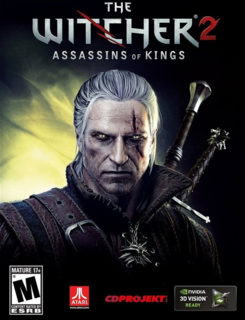The Witcher 2 is not only the best looking game ever, it's also one of the best RPGs in years.
As Geralt of Rivia, a mutant monster-slayer, you pick up the proceedings shortly after the events of the first Witcher, as you join the King's side as he mounts an attack on another kingly foe. The battlements are wondrous and the action is immediately intense. Unfortunately, the tutorial doesn't do much to teach you all you'll need to know to find success early on, and instead throws you hilt-deep into the fray right off the bat. While it's a shame that you'll spend your first many hours dying quite a bit, you'll still learn one important fact about the game from these early moments: The Witcher 2 is a hard game, but hard in a way that makes you want to keep playing, as it feels like a significant victory taking down even a handful of guards early on. This all-important fact is what will initially drive you to spend the critical time to grab alchemical ingredients for potions (which you can only use out of combat) and teach you the hard way to block and roll to avoid being hit. These opening moments serve to distinguish the Witcher 2 from other hack-n-slash RPGs, where a few hits won't decimate your health meter. As combat has been overhauled altogether, utilizing a strong and weak swing and granting all magical abilities off the bat, it's clear that, not only have things changed since 2007 – they've changed for the better.
Of course, the other thing you'll notice immediately is just how beautiful The Witcher 2 is. Snowy mountain peaks crest the skyline as banners wave in the wind and trebuchets launch sporatically. Each rock, each winding tree looks as if uniquely crafted into this land, and as you zoom up close to each character, each piece of clothing material looks distinct, whether leather or fur or cotton. Essentially, the Witcher 2 looks in real-time gameplay what most games can only summon up during a cut-scene. Not only are the visual technically the most impressive visuals in any video game to date, but they're also the conjoining of artistic design: each object doesn't just look real, which is a feat, but is clearly artistically imagined too. The design seems the perfect union of technics and art all at once. I don't want to overshadow the sound design either, since we're talking aesthetics, as the brash orchestral accompaniment is superb, the voice acting solid at conveying individual character, and the environmental sounds spot on.
Now most RPG aficionados expect great gameplay, or perhaps amazing visuals, or maybe an intelligent crafting system. The Witcher 2 provides all of that and then some, and then sets it in a multi-branching narrative with real choice that puts every single Bioware title to shame. Rather than making critical decisions based on what you think the "right" or "wrong" action is (or even worse, what you think the game thinks are "right" or "wrong"), every decision is simply a matter of figuring out what you think is the best means to your end. These choices have profound impacts at every stage of the game, and add up to a sizable sixteen different ending scenarios. Do you side with the elven-terrorist-freedom-fighters or rather ditch them under a burden of questionable responsibility for a king not even your own? Do you save a handful of whores from a burning building or alternatively chase the assassins of kings through the forest? These critical decisions propel what is already a great game forward with stunning narrative complexity without losing that all-important sense of urgency, at least until the final chapter. Through and through, the Witcher 2 doesn't talk down to its audience and it's thematically "adult" story-arcs don't feel close to adolescent titillation. Rather, the entire means of storytelling in the Witcher 2 is focused squarely on the specific characters and events which unfold with steel-eyed pragmatism, legitimate discussions about grown-up topics, and it thereby consistently avoids the pitfalls of easy tropes.
Of course, the Witcher 2 is not without its faults; the game is smattered with a few annoyances. For instance, opening doors can be quite a chore, as Geralt has problems bringing the correct icon to bear and then needs to square the door appropriately before slowly entering. Inventory management can also be a pain and item weight can be problematic, as carrying more than one set of armor or a load of iron ore (needed for crafting weapons) severely hamper the ability to squirrel away items for vendors or crafting. However, much of what may initially distract a newcomer to the game, specifically not being able to use potions in combat, are clearly design choices that, though sometimes questionable, drive the game forward in specific ways. It's not a perfect game, but it's problems are minor in comparison to its successes.
Though Polish developer CDProjekt is still cutting its teeth in video game development, they've made a strong statement that the way forward for classic role-playing may not run through Japan, Canada, or the US. Not since Dragon Age: Origins have role-playing fans been rewarded with such high-caliber play. Though The Witcher 2 is not without its faults, it's far and away the best RPG since 2009 and may even give the upcoming Skyrim a run for its money. If you like RPGs, you owe it to yourself to play the Witcher 2.

